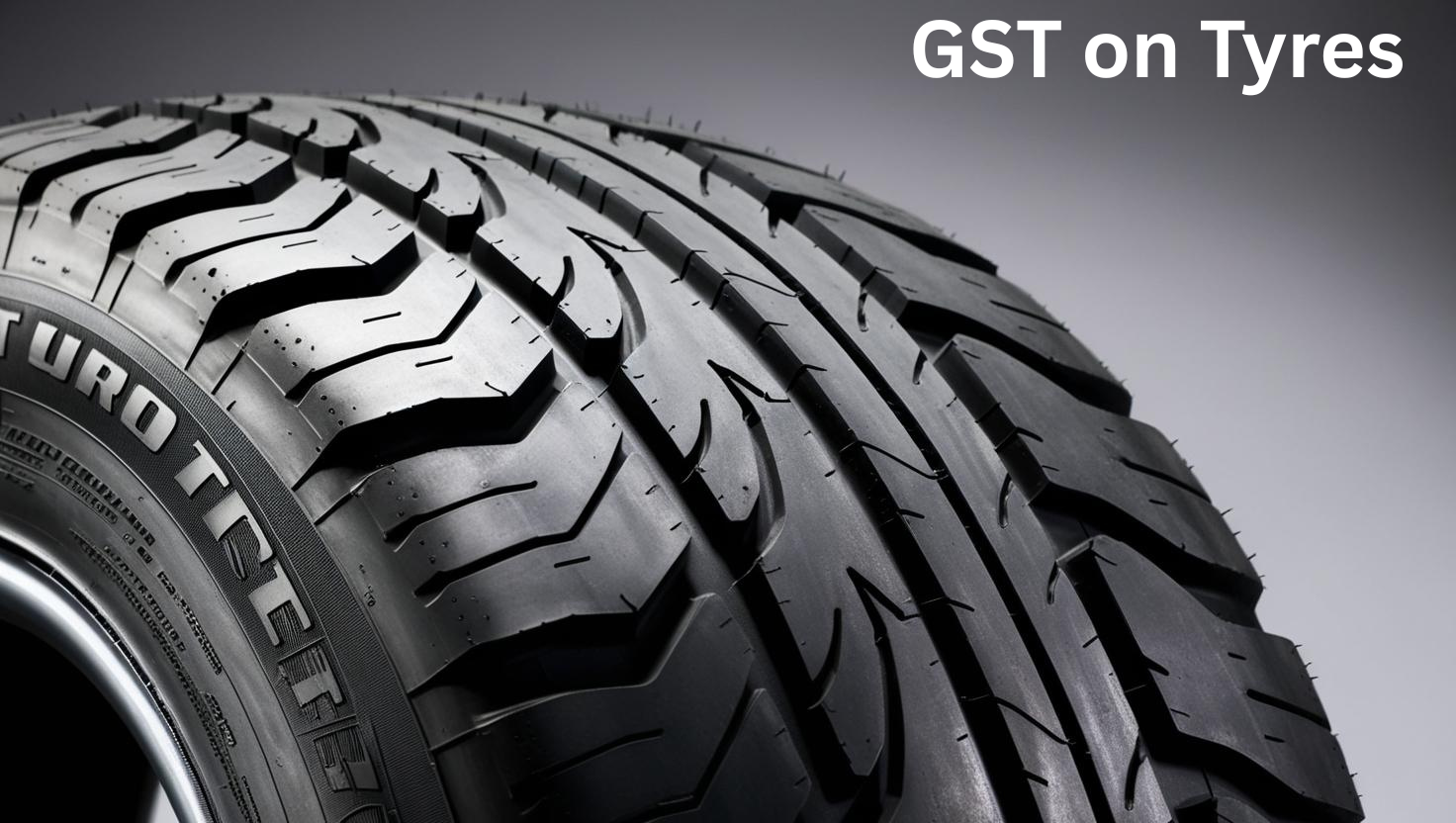GST, or Goods & Services Tax, was introduced in India on the 1st of July, 2017, as a one-in-all indirect tax system. At the time of the launch, GST was divided into the following six tax slabs: Nil, 0%, 5%, 12%, 18%, and 28%.Automobile tyres mostly use natural rubber as inputs. However, applicable GST rates on tyres vary significantly compared to other rubber-derived finished products, like gloves, latex threads, etc. In addition, GST rates on different tyres also differ widely.

What is the GST on Tyres?
- Pre-GST, basic customs duty (BCD) for importing natural dry rubber was around 20%.
- Post-manufacturing, Original Equipment Manufacturers (OEMs) were required to pay Value Added Tax, Central Excise, etc.
- Dealers and traders paid state-specific taxes such as sales tax and octroi.
GST unified all these different taxes with a single tax structure throughout India. For GST applicability purposes, tyre as a product segment is further categorised, with specific HSN for each category,
- Car (4-wheeler) tyres
- Non-motorised bicycle tyres
- Motorised 2-wheeler tyres
- Bus and commercial vehicle tyres
- Tyres used in agricultural-use vehicles
- Aviation tyres
- Retreaded second-hand or used or recycled tyres
GST on Tyre-related Services
Tyres attract a flat GST at an 18% rate. So, if the value of the tyre includes a retreading-related service charge, then the services also attract 18% GST. If any registered entity charges for tyre repair and maintenance services, then the HSN code will be 9987, and the applicable GST rate will be 18%.
GST Rate and HSN Code for Tyres
Category | HSN | Applicable GST Rate |
| Car (4-wheeler) tyres | 401110 | 28% |
| Non-motorised bicycle tyres | 401150 | 5% |
| Motorised 2-wheeler tyres | 401140 | 28% |
| Bus and commercial vehicle tyres | 401120 | 28% |
| Tyres used in agricultural-use vehicles | 401161 | 12% |
| Aviation tyres | 401190 | 18% |
| Retreaded second-hand or used or recycled tyres | 4012 | 18% |
Input Tax Credit (ITC) for Tyres
- First of all, ITC is available only to GST-registered entities.
- The second key eligibility for claiming ITC is business usability. For example, a truck fleet owner can claim ITC for GST paid on the purchase and repair of truck tyres. However, the same owner cannot claim GST credit while purchasing tyres for their personal use car.
- ITC is not allowed on tyre-related expenses in private passenger vehicles.
- A cab operator can claim ITC on tyre-related expenses if the operator collects GST on their cab rental services. However, the operator cannot claim ITC operating under a cab aggregator. For example, a cab owner affiliated with Ola, Uber or similar app-based aggregators does not charge or collect GST from passengers directly. Instead, the app-based aggregating company pays the cab-owner a commission. So, such a cab owner cannot claim ITC on GST paid on tyres for their cab.
- Registered dealers and traders of new and retreaded tyres can claim ITC, provided they collect GST from their customers.
FAQs
Q1. How much GST applies to scrap tyres?
Rubber scrap from discarded tyres attracts a GST rate of 5% for HSN 4017. However, HSN 4004, applicable to hard rubber from scrap tyres, attracts 18% GST.
Q2. How is GST calculated on tyre sales?
- Identify the HSN code and determine applicable GST rates.
- Calculate the GST payable on the base price of the tyre.
- Add the calculated GST payable amount with the base price. The sum will be the customer’s final payable price for the tyre.
- If you are eligible for the ITC, ask the seller to issue a B2B invoice with all the relevant details.
Q3. Are there any GST exemptions for tyres?
There is no exemption from GST for tyres. However, agricultural-use tyres and bicycle tyres attract GST at lower rates.
Q4. What is the GST rate for tyres?
- For bicycle tyres – 12%
- For agriculture-use tyres – 12%
- For buses and trucks – 18%
- For aircraft tyres – 18%
- For all other types of tyres – 28%
- For retreaded (used) tyres – 18%
Q5. Impact of GST on Tyre Industry?
For Consumers:
- A uniform tax rate under GST across India has removed confusion regarding the taxation component in tyre prices.
For Manufacturers:
- The single-rate taxation system under GST removed the accounting complexities.
- Manufacturers are experiencing faster disbursement of tax credits.
- Pre-GST, some states offered production-linked tax subsidies to manufacturers, making manufacturing cheaper in those states. But now, manufacturers can set up production units anywhere in the country and enjoy the same tax rate.
For Dealers and Traders:
- They can claim ITC on GST paid on the purchase of their stocks.
Q6. What is the GST rate on retreaded or used tyres?
The GST rate on retreaded tyres is 18%.
